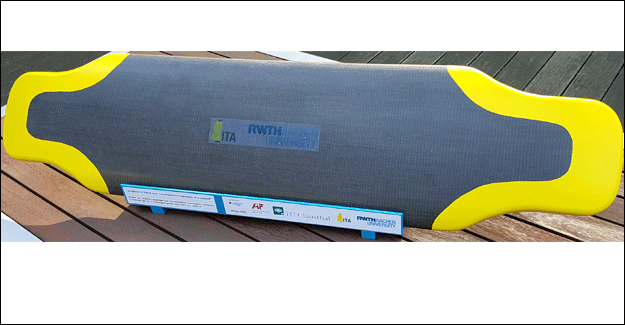
ITA To Showcase Natural Fibre Benefits At Hanover Textile Show
The Institut für Textiltechnik (ITA) der RWTH Aachen University presents a longboard deck made of natural fibre-reinforced plastic (NRP) at the stand of the Federal Ministry of Economics and Energy (BMWi) in Hall 2 C 28. Using natural fibres represents an ecological alternative to resource-intensive reinforcing materials such as glass fibres.
In cooperation with the Institute of Polymer Materials and Plastics Technology at Clausthal University of Technology, the ITA investigates the potential of highly oriented natural fibre fabrics for structural fibre composite applications as part of the HyPer-NFP (High-Performance Natural Fibre Reinforced Plastics) project. With this innovative approach, the otherwise necessary yarn building process can be eliminated. The natural fibres can thus be oriented more in load direction so that the composite show better mechanical properties comparable to those of glass fibre-reinforced plastic (GRP). At the same time, the savings in the spinning process lead to a significant reduction in process costs. Compared to GRP, significantly less energy is also required for the production, making the new composite material more ecological.
By improving the mechanical properties and reducing the price of materials, the course is set for the application of NRP in structural components.
Background:
Non-crimp fabrics are often used as reinforcement structures for mechanically highly stressed composite fibre structures in industrial lightweight construction. These are made of continuous filament rovings made from glass, carbon or aramid. Using these materials requires a high energy input in fiber production and thus leads to high CO2 emissions in the production of fiber composites (FRP). Compared to GRP, during NFP production, energy savings of about 40% can be achieved which is mirrored in about 30% lower CO2-emissions. NFP is therefore already used for selected, non-structural components with low mechanical properties (EU 2015: 120,000 t). Due to the additionally necessary process step of yarn production, natural fibre fabrics are however rather expensive (flax fabrics: 16-20 €/kg). In addition, the maximum achievable mechanical component tenacity is reduced by the use of staple fibre yarns.
The Federal Ministry of Economics and Energy (BMWi) will also be represented at the Hanover Fair in 2018. Under the motto "Ideas become innovations", visitors to the BMWi stand can expect an extensive range of products and services.
Turning ideas into innovations
The BMWi supports the innovative strength and research implementation of SMEs and industry as important engines for growth and employment through numerous initiatives, funding programmes and networks. New technologies and projects from the fields of energy, smart services, innovations and start-ups will be presented at the exhibition stand. In addition, interested parties can obtain advice on funding opportunities and other topics. A stage programme, moderated by Volker Groß (Radio Bonn/Rhein-Sieg), and other events, including the award ceremony for the winners of the Digital Innovation Founder's Competition, round off the offer.
Textile Excellence
If you wish to Subscribe to Textile Excellence Print Edition, kindly fill in the below form and we shall get back to you with details.












